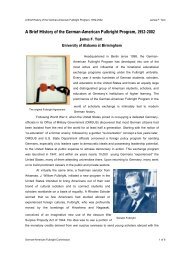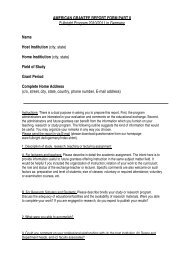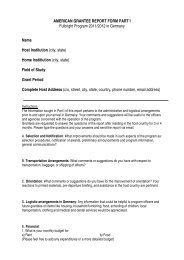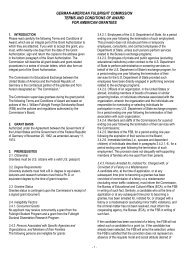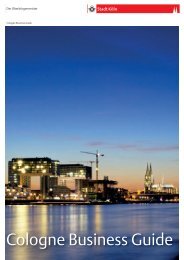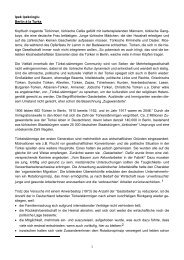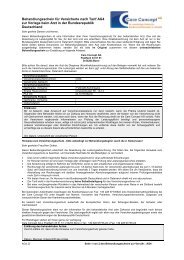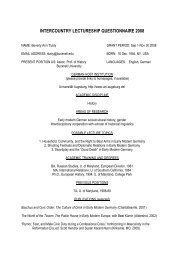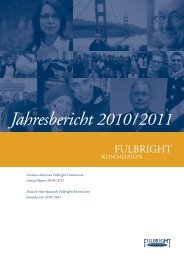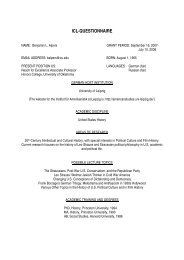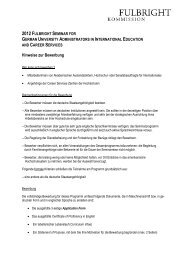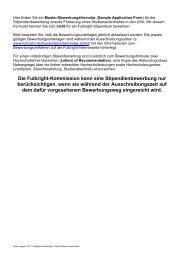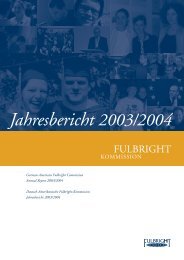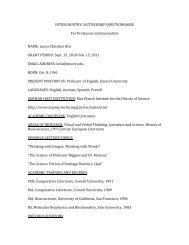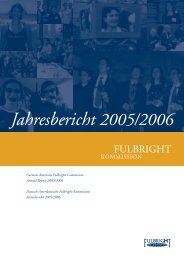The First Class of Fulbrighters - Fulbright-Kommission
The First Class of Fulbrighters - Fulbright-Kommission
The First Class of Fulbrighters - Fulbright-Kommission
You also want an ePaper? Increase the reach of your titles
YUMPU automatically turns print PDFs into web optimized ePapers that Google loves.
A New Perspective<br />
by James E. Turner<br />
GOING TO GERMANY as a <strong>Fulbright</strong> student to<br />
study theoretical physics in Göttingen in 1953-54 was the<br />
dream <strong>of</strong> a lifetime. In the mid-1920s this beautiful city<br />
was the birthplace <strong>of</strong> modern quantum theory, which has so<br />
pr<strong>of</strong>oundly revolutionized physics and contemporary life. At<br />
the university in Göttingen, I attended lectures given by,<br />
Heisenberg himself, whose signature I proudly have in my<br />
Studienbuch today.<br />
From the start, and all during the<br />
<strong>Fulbright</strong> year, I felt welcome wherever<br />
I was. <strong>The</strong> pr<strong>of</strong>essors and students<br />
at the university were considerate and<br />
helpful. I was very fortunate to find<br />
(with great difficulty) a room with one<br />
special German family. (Housing in Germany was extremely<br />
scarce in 1953. One <strong>of</strong> the first practical German expressions<br />
I learned after arriving in Göttingen was “schon besetzt!” 1 ) <strong>The</strong><br />
family comprised the parents and three sons about my age<br />
and somewhat younger. <strong>The</strong>y took me in and came to treat<br />
me like a fourth son. I stayed in touch with my landlady<br />
through numerous trips back to Germany until her death<br />
some years ago, and I still have contact with one son in the<br />
U. S. Spending the year with that family meant a great deal.<br />
My best friend in Göttingen was fellow <strong>Fulbright</strong> student<br />
Jack Waldrip. Jack arranged a blind date for me. I<br />
went to the students’ Faschingball 2 with a visiting German<br />
girl—a friend <strong>of</strong> a friend from out <strong>of</strong> town. My date and I,<br />
<strong>of</strong> course, had no idea that we were meeting our future life<br />
partners. In the ensuing months, Renate and I fell in love, I<br />
met her family, and we hoped to get married. I had no money<br />
or other resources, nor did she, but we made plans. After<br />
the <strong>Fulbright</strong> year, I would return to Vanderbilt, where I<br />
had started as a graduate student. Renate would apply for<br />
an immigration visa to the U.S.<br />
AFTER I LEFT GERMANY to return home we were<br />
separated for 14 long months. Back then there was no telephoning<br />
overseas and mail was very slow. When her papers<br />
were finally approved, Renate arrived in New York in October<br />
<strong>of</strong> 1955. We got married soon thereafter, a year before I<br />
finished my degree at Vanderbilt. We have raised three kids<br />
and will celebrate our 48th anniversary this year.<br />
Incidentally, Jack Waldrip (who had introduced Renate<br />
and me) and I lost contact after we left Göttingen and were<br />
unable to locate one another in subsequent years. It was<br />
only recently through the activities <strong>of</strong> the <strong>Fulbright</strong> Commission<br />
in the celebration <strong>of</strong> the 50th anniversary that we<br />
located each other again. We met last December for the first<br />
time in more than 48 years and took up right where we left<br />
<strong>of</strong>f. We thank Bettina Ross from the <strong>Fulbright</strong> Secretariat<br />
for her help!<br />
I learned a lot about America<br />
in that year, especially in<br />
ways that would not have<br />
occured to me otherwise.<br />
1) Already occupied! 2) One <strong>of</strong> a number <strong>of</strong> pre-Lenten festivities in Catholic parts <strong>of</strong> Germany<br />
AS I LOOK BACK, I can recall an unexpected benefit<br />
that the <strong>Fulbright</strong> year had for me and likely for most <strong>of</strong> us<br />
students. I learned a lot about America, especially in ways<br />
that would not have occurred to me otherwise. I formed a<br />
different perspective on relationships between people with<br />
different cultures, languages, and values. I remember how<br />
the German audience laughed at newsreel pictures <strong>of</strong> the<br />
1953 Army-Navy football game.<br />
Well, it looked silly. But some <strong>of</strong> our<br />
folks take the game seriously. I mention<br />
that experience only as a single,<br />
trivial example <strong>of</strong> something that I<br />
gave little consideration to before.<br />
Things <strong>of</strong> importance and even deep<br />
concern in one country can be unknown or completely<br />
immaterial in another. It is not a matter <strong>of</strong> one being better<br />
than another, but <strong>of</strong> respect, understanding, and tolerance. I<br />
am not <strong>of</strong>fering any great insight by relating what, <strong>of</strong><br />
course, is so obvious; as a <strong>Fulbright</strong> student living in a foreign<br />
country for the first time this was new to me.<br />
THE FULBRIGHT SCHOLARSHIP also enabled<br />
me to learn German, which has been a significant pr<strong>of</strong>essional<br />
and personal asset. Together, Renate and I have translated<br />
translated two German textbooks<br />
on radiation and its<br />
effects. My grandfather emigrated<br />
from Hüttenbusch, near Bremen,<br />
to Savannah, Georgia, in<br />
1865 at the age <strong>of</strong> 17. He was<br />
never able to return to Germany.<br />
My being able to speak the language<br />
greatly facilitated finding<br />
the descendents <strong>of</strong> my grandfather’s<br />
sister, still living on the<br />
farm that he left. <strong>The</strong> family living<br />
there now has a picture <strong>of</strong><br />
their great-great grandparents<br />
which is the same picture my<br />
mother had in Savannah <strong>of</strong> her<br />
grandparents. Our relationship<br />
has thus been established definitely<br />
as second cousins once<br />
removed. We have had several<br />
family members from Hüttenbusch<br />
visit us in Oak Ridge.<br />
What does being a part <strong>of</strong><br />
the first German <strong>Fulbright</strong> class<br />
<strong>of</strong> ‘53 mean to me? As it has<br />
turned out, … almost everything.<br />
I am a very grateful member<br />
<strong>of</strong> the <strong>Fulbright</strong> alumni.<br />
30 31<br />
James (Jim) Turner grew up in<br />
Savannah, Georgia. He went to<br />
Emory, Harvard, Universität<br />
Göttingen (<strong>Fulbright</strong>), and Vanderbilt,<br />
where he obtained a Ph.D. in<br />
physics in 1956. He taught at Yale<br />
before going to the Atomic Energy<br />
Commission in Washington. In 1962<br />
Turner joined Oak Ridge National<br />
Laboratory and retired as a Corporate<br />
Fellow in 1996. He also served<br />
as an Adjunct Pr<strong>of</strong>essor at the University<br />
<strong>of</strong> Tennessee. He has published<br />
extensively in the field <strong>of</strong> radiation<br />
physics and has had an active role in<br />
research and teaching, both nationally<br />
and internationally. He is the<br />
author <strong>of</strong> three textbooks.



